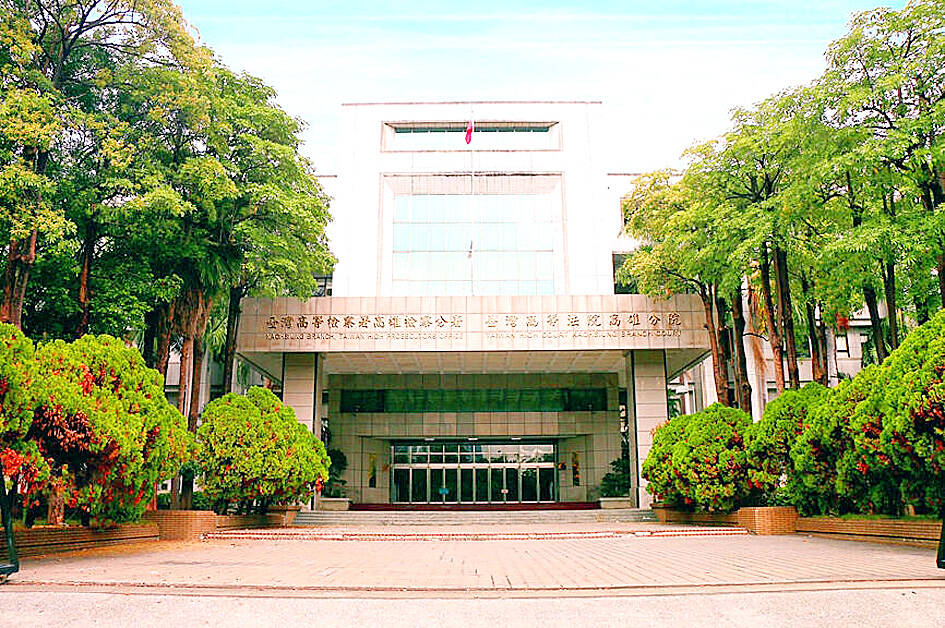Four defendants charged in a national security case for allegedly working for China and infiltrating the military were acquitted yesterday.
The High Court’s Kaohsiung branch handed down not guilty verdicts for retired naval rear admiral Sun Hai-tao (孫海濤), retired army colonel Liu Wan-li (劉萬禮), writer Chu Kang-ming (祝康明) and defendant Kuei Ya-ti (歸亞蒂) on grounds of insufficient evidence.
They were initially indicted on charges of contravening the National Security Act (國家安全法), the Anti-Infiltration Act (反滲透法) and other offenses related to contravening election laws.

Photo: Pao Chien-hsin, Taipei Times
Officials from the High Prosecutors’ Office’s Kaohsiung branch yesterday said they would appeal the ruling.
The four were accused of receiving financial assistance from Beijing, after traveling to China, where they allegedly agreed to work with Chinese officials to develop spy networks in Taiwan.
Prosecutors said the four enticed active and retired military officers to join the network by taking them on junket trips to China and the US, funded and arranged by the Chinese United Front Work Department. They then allegedly recruited officers to form spy networks, obtain classified materials and assist in Chinese propaganda work and “united front” tactics.
Raids were conducted in late 2023, with prosecutors saying that the four received funds from China to purchase gifts, organize banquets, and bribe military personnel and friends to vote for particular election candidates, in contravention of the Presidential and Vice Presidential Election and Recall Act (總統副總統選舉罷免法).
Academics who specialize in legal affairs yesterday said the ruling was a blow to the morale of police and prosecutors, adding that it was tantamount to encouraging proxies of the Chinese Communist Party.
Lo Cheng-chung (羅承宗), a professor at the National Kaohsiung University of Science and Technology’s Graduate Institute of Science and Technology Law, said that while the system requires judges to take national security classes, the ruling demonstrated there still exists a lack of awareness regarding national security threats among judges.
Additional reporting by Chen Yu-fu

Taiwan is stepping up plans to create self-sufficient supply chains for combat drones and increase foreign orders from the US to counter China’s numerical superiority, a defense official said on Saturday. Commenting on condition of anonymity, the official said the nation’s armed forces are in agreement with US Admiral Samuel Paparo’s assessment that Taiwan’s military must be prepared to turn the nation’s waters into a “hellscape” for the Chinese People’s Liberation Army (PLA). Paparo, the commander of the US Indo-Pacific Command, reiterated the concept during a Congressional hearing in Washington on Wednesday. He first coined the term in a security conference last

Prosecutors today declined to say who was questioned regarding alleged forgery on petitions to recall Democratic Progressive Party (DPP) legislators, after Chinese-language media earlier reported that members of the Chinese Nationalist Party (KMT) Youth League were brought in for questioning. The Ministry of Justice Investigation Bureau confirmed that two people had been questioned, but did not disclose any further information about the ongoing investigation. KMT Youth League members Lee Hsiao-liang (李孝亮) and Liu Szu-yin (劉思吟) — who are leading the effort to recall DPP caucus chief executive Rosalia Wu (吳思瑤) and Legislator Wu Pei-yi (吳沛憶) — both posted on Facebook saying: “I

Sung Chien-liang (宋建樑), who led efforts to recall Democratic Progressive Party (DPP) Legislator Lee Kun-cheng (李坤城), was released on bail of NT$80,000 today amid outcry over his decision to wear a Nazi armband to questioning the night before. Sung arrived at the New Taipei District Prosecutors’ Office for questioning in a recall petition forgery case last night wearing a red armband bearing a swastika, carrying a copy of Adolf Hitler’s Mein Kampf and giving a Nazi salute. Sung left the building at 1:15am without the armband and covering the book with his coat. Lee said today that this is a serious

The Ministry of Economic Affairs has fined Taobao NT$1.2 million (US$36,912) for advertisements that exceed its approved business scope, requiring the Chinese e-commerce platform to make corrections in the first half of this year or its license may be revoked. Lawmakers have called for stricter enforcement of Chinese e-commerce platforms and measures to prevent China from laundering its goods through Taiwan in response to US President Donald Trump’s heavy tariffs on China. The Legislative Yuan’s Finance Committee met today to discuss policies to prevent China from dumping goods in Taiwan, inviting government agencies to report. Democratic Progressive Party Legislator Kuo Kuo-wen (郭國文) said